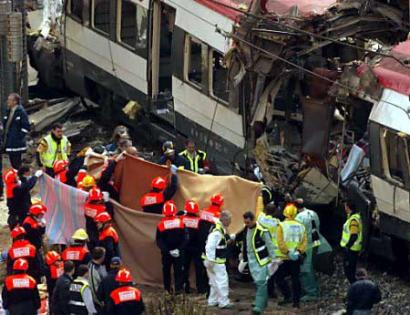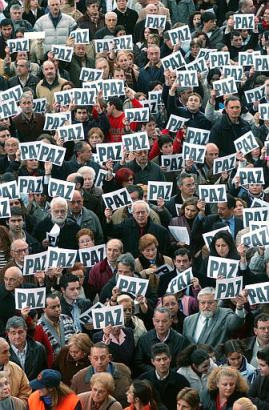|
Update: Bombing suspects dead. Since the day that 192 rush-hour commuters died while more than 1,800 others were injured in Madrid, Spanish authorities have been issuing arrest warrants for a band of Spanish, Moroccan, Tunisian, Jordanian, Syrian and Indian nationals. Their membership included those of the Moroccan Islamic Combat Group, a loose affiliate of the al-Qaeda network responsible for the bombing attacks in Casablanca on 17 May 2003 that killed at least 41 people. |
|
| Five bombing
suspects, including the alleged Tunisian ringleader, resisted arrest on 3
April by blowing themselves up in their apartment, taking one Spanish
officer with them. Their suicide shortly followed the discovery of a bomb
at the track of the express train linking Madrid and Seville. The device,
made from the same materials as the 11 March bombs, would have exploded
had it not been for its faulty wiring.
Recap: The general election. The swift arrest of the other suspects (only two on the wanted list now remain at large) provided relief to a traumatized public, who had to vote in a general election just three days after the Madrid attacks. Before 11 March, polls showed that the ruling Popular Party was to win the election on 14 March by a small margin. Led by PM Jose Maria Aznar, who did not run for a third term, Spain dispatched soldiers to Iraq in 2003 despite overwhelming public disapproval. Immediately following the attacks, the government laid blame on the armed Basque separatist group ETA, but had since conceded to growing evidence towards Islamic extremists in apparent revenge for Spain's participation in the Iraq war. Expectedly, the Spanish electorate took issue against Aznar's government. With a 77% turnout, they gave the Socialists 42% of their votes, while the Popular Party received 38%. PM-elect Jose Luis Rodriguez Zapatero quickly announced plans to withdraw the 1,300 Spanish troops from Iraq upon the end of their scheduled assignment in June, barring an extension by UN mandate. "Spain to rejoin 'Old Europe'," read a BBC headline, in reference to US Defense Secretary Donald Rumsfeld's remark that characterized France's and Germany's reluctance to invade Iraq. More worryingly, the 11 March attacks were likely to aggravate the worsening deterioration of goodwill towards the burgeoning, but marginalized, Muslim communities throughout western Europe. (Source: Reuters, BBC online) |
||
When will they ever learn?
I posted the following paragraph in this site back in 25 August, 2002, more than six months before the war in Iraq [click here to read the original essay, "The War on Terrorism Has Gone Cold]:
Aside from the insidious pleasure of seeing some fellow Arabs playing David against the American Goliath, inflicting massive casualties within US borders (something that had not been done by foreigners since December 6, 1941 at Pearl Harbor), would any Arab or Muslim society ever benefit from the 9/11 attacks? Would the West be thus coerced to do its bidding? The answer will always be a resounding NO – and the terrorists know it, too. Yet they thrive on the premise that, the bigger their attacks get, the more likely their victims may give them more than their due. The moment terrorists began taking down airports and landmarks, they were bestowed the mythic status of a nefarious empire capable of world domination -- something right out of a James Bond movie.
I don't expect much to change in just a little over a year. It hasn't.
When will the terrorists ever learn? In a free, prosperous and law-upholding society, a fringe group will never advance its cause via murderous mayhem -- be such cause political, religious, or merely psychotic.
It never worked for the ETA.
As their organization becomes more transparent to the Spanish and the French police, they're disowned even by the Basques themselves, who for the most part do want greater autonomy from Madrid, but still wish to remain Spanish citizens.
It never worked for the IRA.
After decades of bombings, shootings and internal feuds amongst the Catholics and the Protestants in northern Ireland, the Troubles subsided only when true representatives from both sides agreed to form a joint government -- and that the Irish Republican Army should disarm so that the Sinn Fein could shed its onus as a front for terrorists, and become a legitimate political party.
|
Peace! On March 12, 2004, much of Spain and the Spanish-speaking world went to the streets to demonstrate against the attacks. This photo was taken in A Caruna, Spain. (AP/EFE Photo by Torrecilla) |
It never worked for the PLO.
The militant Palestinian Liberation Organization became the administrative Palestinian Authority in the mid-1990s when the '94 Nobel Peace Prize winners, Israeli PM Yitzhak Rabin and Palestinian leader Yasser Arafat, actually enjoyed a rapprochement of sorts. Things fell rapidly back to hell when Rabin was assassinated in '95 by a Jewish right-wing radical, and Arafat was unable to cut a deal with Ehud Barak at Camp David in 2000 when both had the opportunity, over the status of Jerusalem as a capital for both Israel and Palestine. By the time Ariel Sharon walked provocatively onto the Temple Mount in 2000, the PA fully reverted to insurgency mode, and all but threw away its chance at peace and economic revival, let alone statehood. It never worked for the Aum Shinrinkyo. Perennially prone to earthquakes and the memory of being the sole target of a nuclear attack, the Japanese have long accepted the apocalypse as a macabre sort of cultural identity. However, it's one thing for them to see Tokyo repeatedly destroyed by giant mutant lizards or alien robots, and quite another to see a doomsday cult that actually acted cataclysmic deeds out of its wacky beliefs. The swift and severe prosecution of the subway gas attackers was not only a matter of justice, but a purging of national shame. |
It never worked for Tim McVeigh, Ted "the Unabomber" Kaczynski, or anyone else of the radical left or the radical right in America. For these would-be revolutionaries, delusions of grandeur were just that.
It never worked for the Chechens. The more desperate they were to attack the city of Moscow, the more they made Vladimir Putin look good in ruthlessly repressing them back in their homeland.
It hasn't worked yet for al-Qaeda and the morons who emulate them, for all the havoc they wreaked around the world long before 9-11-01 in their pig-headed jihad against the West.
While the Spanish voters did sack the government that had taken their country unwillingly to war, they did no favor for the perpetrators of the 3-11-04 attacks. By becoming more insular, Spain would not only pull out of Iraq, but also likely to lose interest in fostering political, cultural and economic ties with its north African neighbors. Meanwhile, the Arab and Muslim communities already within Spanish borders would now have to face worsening hostility and mistrust, as did their counterparts elsewhere in Europe and North America.
The only gains for the terrorists have always come from their exploitation of a poor, backward and isolated nation, either as agents of or insurgents against a corrupt regime. They might as well stop wasting their time blowing up skyscrapers, airplanes and trains in countries that have them in abundance, and stake their interests in the incessant conflicts of Haiti, Colombia and throughout Africa, as they once did so in Afghanistan -- and are now doing in Iraq.
There, in the fog of war, the worst thing that could happen to them is not their annihilation, but the loss of their relevance to the rest of humanity.
-- CW, 11-12 March 2004, updated 15 March. 2 and 3 April 2004
| Back to top |


